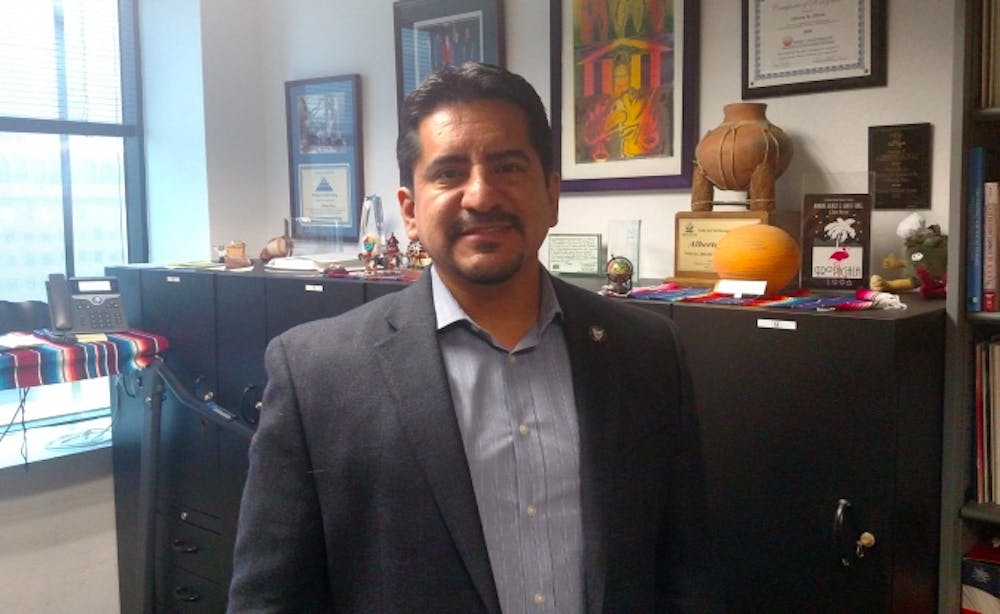It is perhaps the most repeated political cliche that we should put country before party, but what does that really mean, and how can one be political without being partisan?
The idea of unity has been historically prevalent, from President George Washington’s Farewell Address to the derision of the labeling of red states and blue states in President Barack Obama’s 2004 keynote speech to the Democratic National Convention and President Donald Trump’s call to unify the country on election night last November.
However, partisan actors are already beginning to stake out positions in favor of the 2018 elections with more liberal groups attempting to form a resistance similar to the conservative Tea Party movement formed in 2010.
For the roughly 34 percent of voters in Arizona who care but are not registered with any party and perhaps many more who have not found a reason to register in the current debate, this is probably infuriating.
See Counterpoint: Millennials have opportunity to change partisan politics.
But an often hidden truth is that there are a wealth of opportunities to engage with the system and make sure your voice is actually heard because of your independent status and not despite it.
The Morrison Institute for Public Policy at ASU conducts nonpartisan research on public issues in the state of Arizona and has devoted significant time to researching independent voters.
In their study, Who is Arizona’s Independent Voter?, the Morrison Institute found that in general, independents tend to be unified around their desire to not be attached to the polarization of the current political parties.
In recent presidential elections, independents in Arizona voted for President Obama in 2008 and 2012 in large numbers, while in 2016 the group tended toward President Trump.
Further, a look at the 2016 election results in Arizona defies explanation by simple party-line voting. Trump carried the state by four percentage points, Republican Senator John McCain won with 13 percentage points, Republican Sheriff Joe Arpaio lost by 11 percent, the generally liberal minimum wage hike through Proposition 206 won by 16 percent, and the legalization of marijuana lost by a mere two percent.
“What I often say is that most political scientists and media tend to overanalyze how Republicans and Democrats vote," Morrison Institute Director Thom Reilly said. "I think they should spend more time on how independents vote because independents are less predictable and I think are having a larger influence.”
Correcting this underutilization of independents to drive a policy debate is the focus of many different groups.
No Labels is a national group formed in 2010 to push through partisan gridlock with common sense reforms and includes well known congressional and executive leaders of both parties. Its National Strategic Agenda outlines major goals such as creating 25 million jobs over the next 10 years and making America energy secure by 2024.
Closer to home, the Congressman Ed Pastor Center for Politics and Public Service works to promote, publicize and encourage political engagement and public service in the ASU community.
Executive Director Alberto Olivas, who has served under both Democratic and Republican governors in Arizona, believes that there are both nonpartisan and multipartisan ways to include people of all stripes in decision-making processes.
“Multipartisanship, from my point of view, is when you are seeking to address a problem or an issue in a community and have as a goal the intentional inclusion of stakeholders from different political points of view for the purpose of finding what is the common ground that everyone can support in the issue,” Olivas said.
He pointed out the Arizona Town Hall as a great example as they purposely invite stakeholders from a diverse variety of backgrounds to discuss major issues.
The main difficulty to this approach highlighted by both Reilly and Olivas is a matter of information for those who choose to not be aligned with a party.
While people in general tend to not want to be told what to do by advocates, the ability to get information on what values people have through their association with a party is severely lacking.
Some public resources exist, such as the voter guide and information from the Arizona Clean Elections Commission, but people tend to self-select the news they receive and the friends they talk to by political preference, according to the Morrison Institute’s study Voters, Media & Social Networks.
However, there is hope as both sides talk to independents who tend to share views across the spectrum.
We live in dramatic times where the public conversation has been monopolized by those who can scream the loudest for one party or the other.
But what we need is problem-solving nonpartisans to hold conversations with their community members, support the spread of accurate information and to run for office so that we can really move politics to be beyond party and for the people.
Reach the columnist at raboyd@asu.edu or follow @RyanAndrewBoyd on Twitter.
Editor’s note: The opinions presented in this column are the author’s and do not imply any endorsement from The State Press or its editors.
Want to join the conversation? Send an email to opiniondesk.statepress@gmail.com. Keep letters under 500 words and be sure to include your university affiliation. Anonymity will not be granted.
Like The State Press on Facebook and follow @statepress on Twitter.




